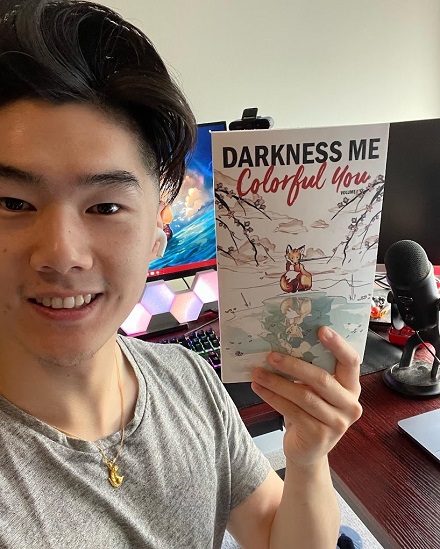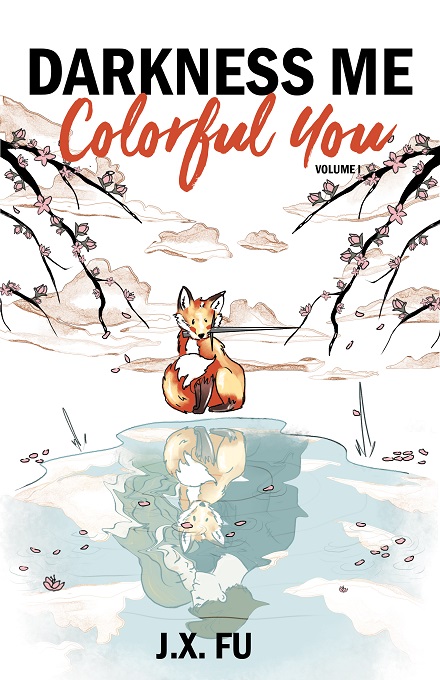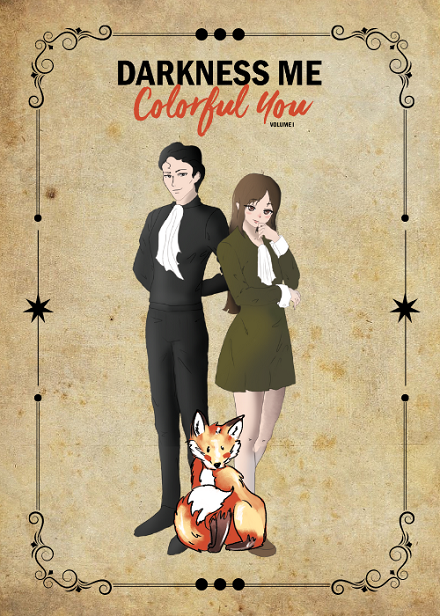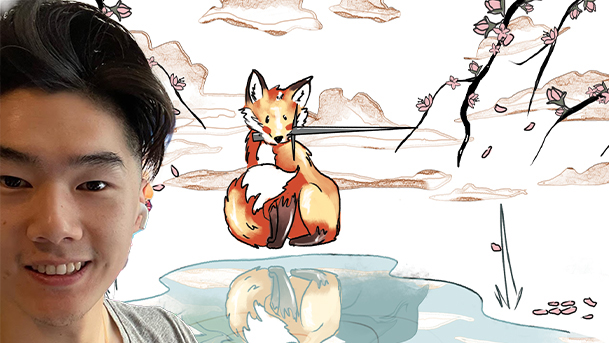Greetings travelers! We’re here today talking to J.X. Fu, a hard-working storyteller that found his voice during a time when many people were struggling. It’s because of that unlocked creativity that he now writes much more often, having released two books over the last few months, with more on the way. But writing is only one fragment of the storyteller’s journey, and now he is trying to engage with an audience. Give this interview a read, and then afterward, dive into J.X. Fu’s catalog!
Tellest: Hi JX! I wanted to start by saying thank you for sharing some of your time talking about yourself and your writing. I know that you’re extremely busy, having just released two books, and having what I’m sure is a mentally taxing day job. A lot of folks don’t realize that writing a book is just the first part of the journey, because you have to help get the word out after the fact, and it can be just as time-consuming as putting the pencil to the page. I’m excited to play a part in helping you spread the word about Darkness Me, Colorful You, as well as your other projects!
J.X. Fu: Greatly appreciated! And thanks for having this interview with me. Happy to dive more into the book and my journey into getting published. I really want to help promote the idea that anyone can start writing a book to completion just like me, no matter what their background or occupancy is.
T: At the onset of these interviews, I enjoy trying to get to the heart of what helped an author take their first steps in their writing journey. Often that begins as a fan to a specific storyteller or style of stories. When was it that you decided you wanted to write your own tales, and who or what was it that really pushed you forward? Did you have a favorite author or a show or movie that inspired you?
JXF: I’ll be honest, I don’t think I have a favorite author like many others will say right away. I follow a ton of different forms of production, ranging from novels to manga to movies. To me, what pushed me forward was the plethora of online communities nowadays who are all writing despite a lack of any relevant background. You see loads of creators out there working away on their writing, art, or other content, chasing their passions without hesitation. It made writing a book easier to digest.
What I like to do nowadays is explore other indie authors and their works, some of their writing pieces are just as amazing as the more famous books we all know, and those are what inspire me these days.

T: We’re here to talk about you and your projects, primarily, but I am curious now. What are some of the gems you’ve happened upon when it comes to other indie storytellers?
JXF: A wide range I can think of. An author I know by the name of Flora Amezcua who wrote an amazing poetry collection named Everlasting: Poetry for Whimsical Souls & Wounded Hearts. Another title would be by my former development editor: Crescent Earth by Ilia Epifanov. TakuNeri by Fei Nerine and A beautiful woman of science and other absurdities by David O. are also recent reads from the English light novel space which I thought were original!
T: You’ve mentioned before about having an affinity for Japanese and American pop culture. How has the knowledge and love of those helped you to craft your own stories and experiences?
JXF: I’m one of the biggest geeks you’ll ever meet. It helped blend my imagination from both cultures into a large pot consisting of my own fiction “writing style.” American culture is vast – you have Hollywood, Disney, and many other classic 80s movies that have since shaped the type of media we consume today. I grew up on all things Marvel, Disney, and living an American lifestyle. For Japanese pop culture, it’s mainly the consumption of anime, manga, light novels, and video games. There are so many tropes, literary themes, genres, plot points, and even character types that have been derived and rewritten in Japanese culture, that some have stuck with me and may even be reflected in my own work.
Overall, I think it’s about taking the bits and pieces you like from both to blend together a craft I was comfortable with.
T: The book that I was first introduced to from your catalog is an emotionally charged one. Darkness Me, Colorful You has origins that will be familiar to some people, but everyone experienced those dark days in their own ways. How did the pandemic affect your creative output, and the story that you ended up creating?
JXF: For sure, the pandemic was a scary experience for many; I was fortunate enough to have a home to return to when it started. Since my work was all remote, a lot of time freed up indoors, so it was an opportunity for me to step back and explore my creative side as much as I could.
I can say that in a counter-intuitive way, my creative output was better during this time, because of all the time I had to really explore what I wanted to write and to world-build. Unfortunately, it still took me some time to finally become consistent with writing – that’s always the biggest challenge I faced, no matter how many cool story ideas grew in my mind.
T: What are some tricks that you’ve learned to help you write more consistently? Do you have a certain time that you try to write? Do you aim for a certain word count each day?
JXF: For me, it’s building a good habit and setting calendar blocks dedicated to “deep thinking/work” mode. Bored? Let’s write. Undisciplined? Schedule a time block in your calendar to get some writing or brainstorming done. I don’t go for certain word counts (I do understand how powerful this goal-setting technique is though), but what I do try to do is establish a habit of writing every day. Going on a streak of at least adding new words to my stories ends up snowballing into certain days where I’ll get a couple thousand words written – it’s a trickledown effect.
T: Thank you for the tips! I hope that some of the writers that are reading this are able to get some insight from that. And I guess, on the flip side of things, what are some traps that you would warn people to avoid when it comes to writing? What kind of things get in the way and cause a bit of a drop in productivity?
JXF: The most prominent trap for me was getting stuck in a loop of chapter (or even plot) revisions – causing me to restart chapters over and over until the deadline crunch prevents me from revising any more. Despite thinking to myself that my ideas are creative, there’s always a part of me that doubts what I’m writing makes any sense. I keep revising chapters or even whole plot lines/sections when I’m doubtful of my storytelling, and thus I stay in an endless “loop” until the deadline obviously prevents me from making any more changes.
T: We talked earlier about how your writing is a blend of pop culture across a few different regions, and certainly you capture some of that in Darkness Me, Colorful You. But there is also a focus on growth in the book. It is character development at its core, but it’s also a message to readers. How important would you say it was to get that message out, and how did you go about creating it in a way that retained your artistry?
JXF: It’s a theme I’m deeply passionate about personally. I think growth as a character or for oneself is deeply gray and full of blur – it’s subjective in nature and can be expressed in millions of ways. I wanted to tackle it from an angle dedicated to a “growth mindset” instead: the desire to always become a better human being every day, to avoid stubbornness or refusal to admit mistakes, and instead to learn from them. I did this in Darkness Me, Colorful You by ensuring that Koka starts off at the worst possible place; the lowest of the low. How will he climb up? Will he divert the blame or embrace it, and simply work on being a better human? It’s a parallel comparison to that mindset.
T: You also use it as a bit of a lesson to readers as well. It’s not preachy by any means, but it’s certainly a message that you try to instill. What are some ways that you have utilized a “growth mindset” in your own life, and what kind of strategies work best for you in order to succeed?
JXF: Probably interacting with different people and learning from their ways of productivity/writing. Sometimes it’s hard for me to put myself forward and engage with online or in-person communities (especially when it comes to writing), but when I do, I realize that there’s endless things to learn just from interacting with others and asking how they manage to write the incredible content they’ve produced.
T: Darkness is not your only released story, as you’ve also published Corruptions Are Best Exposed in the Autumn, a romantic comedy that is wildly different than your fantasy. They also both released within just a few weeks of each other. What was it like balancing the two styles, and the subject matter of each of them?
JXF: Holy hell I love talking about this! One thing I actually do try to suggest, is don’t be afraid to write different pieces within the same timeframe.
If you feel the need to start something new while you’re fresh out of ideas or running on low gas for a current story, don’t hesitate. Take that next step! For me, it actually helped me churn out the proper writing and ideas I needed for both stories. I took a break from writing Darkness Me, Colorful You this past spring of 2022 so I could tackle Corruptions, and then after a while, I went back to Darkness Me, Colorful You with a fresh mind full of new ideas and writing agility. I then went back-and-forth between the two, and I’m happy to say I greatly benefited from hopping between novels, since my mind loves change.
T: These two books are different enough that it almost seems as though there would be a bit of whiplash emotionally. Darkness is a bit more introspective, and perhaps melancholy, while Corruptions has more of a quirky, even jovial feel to it here and there. Was that a challenge, to ensure you retained the heart of each as you zigzagged between projects?
JXF: I can understand why to some it’d be a challenge, since it requires stepping out of your characters’ minds and into new ones to really understand how to write it on paper. For me, it wasn’t too difficult. Zigzagging between different tropes, themes, genres and even feelings for characters allowed me to refresh my creative spirit somewhat if I ever hit a writer’s block. It was challenging to remind myself of what was going on in each story every time I returned to it after a large period of time, but after that initial warmup, I’m back to speed.
T: Your books are classified as light novels, a genre in Japan that are commonly illustrated in a Japanese manga art style and adapted as such. Do you see a future in which your story is tailored to fit that style as well?
JXF: I definitely tried to classify Corruptions Are Best Exposed in the Autumn as such, but not Darkness Me, Colorful You. Wherever it mentioned the latter as a light novel, I’ll have to fix. But this is a good question – I do see a future, but that’s not the only option I’m okay with. Since I’ve already established my own writing style, wherever my style takes me is the future I’ll accept. Western novels, manga style, or anything in-between. However, none of my future novels will probably be classified as a light novel – I’m comfortable with them just being classified as regular Western-style books.
T: Since you’re definitely in the exploratory phase of your writing journey, what other types of projects have you considered jumping into? Have you dabbled in things like Wattpad or Kindle Vella, where the story grows alongside the interactions you receive from readers and fans? What about something more visual, like a graphic novel?
JXF: I’ve actually uploaded Corruptions Are Best Exposed In The Autumn on Wattpad! For me personally, I’d love to have one of my pieces repurposed into a visual work like a web comic, but that’s for the future. Right now it’s probably still sensible to continue the novel route, since there’s still so much to learn and soak up. I do think uploading to certain reading platforms like Wattpad or Tapas enables me to get faster engagement with readers, so I’ll continue doing so for some of my works where it’s feasible!
T: When it comes to something like Wattpad or Kindle Vella, your audience isn’t just along for the ride, but they’re potentially co-pilots. How do you interact with your audience in a way that allows you to be an effective storyteller? Does a reader’s idea ever sway the direction that a story might be going?
JXF: Usually it doesn’t to be quite honest, which perhaps makes me appear stubborn in a way; to me it limits my creativity by relying on others. But what I do love to consider is what readers generally like and dislike about my stories – that feedback plays an immense role for my upcoming chapters or books. If they didn’t like an idea I fleshed out, then I most likely won’t tackle that idea again.

T: In Darkness Me, Colorful You, one of the characters is, in a way, a reflection of yourself. What kind of challenges did you have in trying to infuse your experiences into the story while giving the character their own truth?
JXF: I love redemption stories, specifically because they showcase a realistic trait that we either see or don’t see in our society today: a growth mindset. I have a long ways to go before I can self-claim to have one, but I do love learning and being challenged. I may not have had to go through the difficulties of being shunned by everyone like Koka, but I feel like an accurate reflection in my true life would be how difficult it was for me to succeed in anything I did growing up and even into my days in high school and college. I was never a good student, my grades were average at best, and I had zero talents. My parents probably didn’t have a lot of faith in me back then before I landed my first internship in college. I got into many conflicts with those I was close to, my health and fitness was poor, and my money-spending habits were unsustainable.
Eventually and gradually, I turned things around and worked harder to achieve goals I set for myself in the long-term. I’m proud to say that I feel much more successful today than I did about four or five years ago, but it was a long uphill battle of resilience, patience, and keeping my head down and working hard. That’s why redemption stories resonate with me so deeply. People must scrunch the bottom of the lows to one day reach the peak of the highs.
My favorite quote of all time by my favorite soccer player (Messi) is a simple yet applicable one for me: “It took me 17 years and 114 days to become an overnight success.”
T: What do you think was one of the more defining parts of your life that helped you to make some upward momentum? Was there a particular low you feel comfortable talking about, or was there a mantra that you adopted to help you improve?
JXF: For me, I think there wasn’t a particular event that turned my life catastrophic as a whole, but a series of things around my time in college which piled up to cause that peak of anxiety and depression I mentioned earlier. My grades were poor compared to my peers, I was jobless when it came to part time work and internships, my tuition was being thrown into a black hole, and my health was obviously sucky sucky. When this all happened, I really felt like I had no future to offer back to my family for investing so much into me. In terms of mantra, it all came down to the little things I worked on: returning to the gym on a regular basis, improving my grades slowly but surely, changing tactics on job search, and eventually cutting ties with folks which I felt were adding negative value to my life.
T: Has it kind of opened up the floodgates of optimism for you? And when it comes to feelings of positivity, do you find that your writing style changes, somewhat, to reflect that?
JXF: My writing style definitely changes and reflects the mental state I’m in at the time. You can say it definitely opened up the floodgates. If my mental mindset isn’t backing my writing prowess, I’d say both my technical ability as well as my idea generation process is poorly affected.
T: As a recently debuted storyteller, what would you tell people about what you have coming up next? Are you going to tackle a sequel to Darkness, another light novel, or something altogether different?
JXF: I’ll eventually release a sequel! I’ve committed myself to it by indicating that my book was “Volume 1” – so there’s your piece of commitment by yours truly 😊
However, that’s not going to be the next piece I write. The next one coming up will be a Sci-Fi featuring many deep and controversial literary themes: the role luck plays in our lives, discrimination, racism, corporate politics, and more. Its temporary title is: “Snake-Bitten,” and I’m aiming for an early-2023 release if I keep working at the pace I am now!
T: You mentioned earlier that you would bounce back and forth between your stories. As someone who writes “horizontal” with multiple books at the same time, instead of “vertical” releasing the entirety of a series before moving on to the next one, what sort of benefits do you see besides refreshing your mind? What about challenges to that style of creation?
JXF: For me, other benefits include tackling a vast array of audiences who only read certain genres and learning different writing styles. I get to put my “eggs in different baskets,” and try my hands in a variety of genres, literary themes, or even just character types, which may draw in different types of readers and feedback. As for challenges, it’s definitely the hurdle of getting caught up to speed with one story after hopping over from another. Often when I switch, I have to re-read the chapters again and to review some of my notes to ensure I’m caught up with everything, and sometimes it takes longer to dive “deeply” into a story because of that.
T: Your books are all pretty different, even sitting in different genres. Do you have any sort of secret connective tissue between them all? Or are they all their own, with no references or even Easter eggs to one another?
JXF: I make small references across different books within my writing. For example, in Corruptions, I reference the Gardens of Babylon, which was a major topic used in my Darkness Me, Colorful You plotline. Since obviously the worlds are different in each one (including the story I’m writing right now, which is a Sci-Fi), there’s no tangible connective tissue. I will continue adding Easter eggs and references however, as it’s a cheeky way for me to have fun with my writing style sometimes.
T: Releasing two books (now three, as we’ve learned from a previous answer) is no easy feat, but you’re also working for one of the most popular companies in the world, Microsoft. What is it like trying to balance your day job with your writing career, in addition to the hobbies that you enjoy?
JXF: It’s both emotionally and physically draining, to say the least. If I said it wasn’t, I’d be lying. And even if I truly wasn’t lying, then I wouldn’t be human 😛
There are so many aspects to deal with when it comes to balancing work with writing and other hobbies: context-switching, commitments, goals, habits, mindset, and so on. I’ve grown accustomed to context-switching between work and writing, and I’ve turned writing into a habit. What I try to do is write at least a couple hundred words per day, even on the busiest days during work. That way, I can proudly stay consistent despite the slow progress on the weekdays, so that during the weekends, I can go all out and pump out more words. It’s turned into a habit by this point – on a day I don’t write, it just feels off and unfulfilling to me.

T: You mentioned earlier that when you run into a block in one of your works, you move on to another book to make progress there and perhaps return when you’re able to. Have you ever run into blocks across multiple books and just decided to start the foundation of an entirely new property?
JXF: Yup. This happened recently, actually. I was beginning my “volume two” of Darkness Me, Colorful You and Corruptions but ran into a brick wall. Perhaps writing so much in a smaller period of time is draining, so my mind needed to shift gears entirely and tackle a different genre, with different tropes, literary themes, and plot points. That’s why I started my current project, titled “Snake-Bitten” – a mystery Sci-Fi that tackles sensitive themes such as racism, discrimination, the role of luck, and other areas.
T: If someone wanted to know more J.X. Fu, where could they find that information?
JXF: My personal author website: https://seykafu.com 😊
T: Thank you so much for spending time with us talking about your books and your process, J.X.! It’s always a breath of fresh air to discover someone who is finding their way in the literary world and using their optimism to forge their way forward. It was wonderful getting to know you and your books, and we’re so excited to see where you go from here!
JXF: Of course! Was a pleasure to do this interview. If anyone would like to see all my books, you check out my goodreads: https://www.goodreads.com/user/show/138455353-jx-fu and make sure to leave an honest review!
Once again, I’d like to thank J.X. Fu for sharing their time with us, and for introducing us to their books. Remember, we promoted Darkness Me, Colorful You, Volume 1 on our site last month, and you can get a good grasp of what makes Fu’s story so delightful there. We hope that the author continues to make strides, and are excited for what comes next for them! Check out Darkness Me, Colorful You, Volume 1 on Amazon today!
Michael DeAngelo
Latest posts by Michael DeAngelo (see all)
- Fantasy Promo – Quinine - July 25, 2024
- Sigil Art – Grim’s Hold - July 24, 2024
- Fantasy Promo – Light the Shadows (Under Elfhame’s Stars) - July 24, 2024
